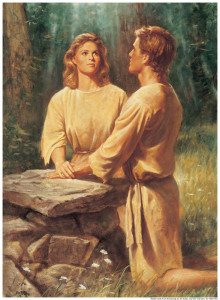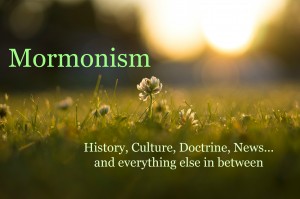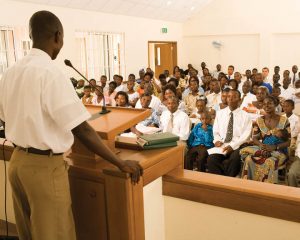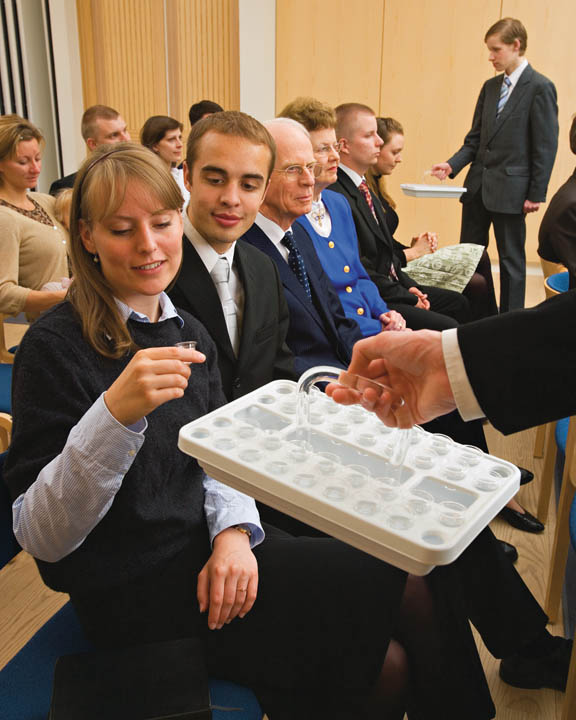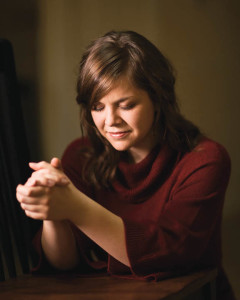People are often shocked to find out that Mormons love Adam and Eve and that Eve is the real hero of that story. They try to explain to me that she was bad—she turned her back on everything God gave her and chose sin instead. They believe she is responsible for all the trials we face today.
Mormons disagree. Let me explain why we disagree and why that story brings out one reason I especially love my Mormon faith.
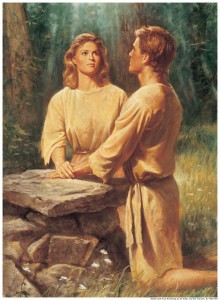 Mormons believe God created our spirits and then let us live in Heaven with Him for a while. We used that time to develop our character and personality, to decide how important loving and obeying God was, and making some decisions about our eternal lives. Eventually, though, we needed to move to stage two of our eternal lives. Would we still live the gospel once we weren’t right there with God—when we might not even be sure He was real? For that, we needed to leave home for a while. Jesus Christ, under God’s direction, created the earth and we celebrated the announcement of this creation.
Mormons believe God created our spirits and then let us live in Heaven with Him for a while. We used that time to develop our character and personality, to decide how important loving and obeying God was, and making some decisions about our eternal lives. Eventually, though, we needed to move to stage two of our eternal lives. Would we still live the gospel once we weren’t right there with God—when we might not even be sure He was real? For that, we needed to leave home for a while. Jesus Christ, under God’s direction, created the earth and we celebrated the announcement of this creation.
Adam and Eve were chosen to come to Earth first, to be the ancestors of every person who would follow. We started off with a good chance of success. There had already been a division in which some people resented the risks of Earth life and chose Lucifer as their leader. They were denied the opportunity to come to Earth. Those who chose to follow Jesus were permitted to make the journey, so we started out having already made a critical right decision.
Now, think about this for a moment. Would God start off the world by sending two people He knew were unrighteous and irresponsible? That doesn’t seem very likely, does it, given that we know how much He loves us? He would want to give us the best possible opportunity to succeed and that starts with a good heritage. Children always have a better chance of success if they have good parents. Having all the people who would ever live to choose from, He would choose the very best. Mormons believe He chose two of His most valiant and wise children to start off the first family
 I personally think of the Garden of Eden as the grown-up equivalent of childhood. After all, they didn’t really get one. It let them get used to having bodies and living away from home. It let them work on developing their marriage in a safe environment. (Mormons believe God personally married them.) However, you’ll recall they had no children in the Garden. It was not until they left the Garden and gained fully mortal bodies that they were able to have children.
I personally think of the Garden of Eden as the grown-up equivalent of childhood. After all, they didn’t really get one. It let them get used to having bodies and living away from home. It let them work on developing their marriage in a safe environment. (Mormons believe God personally married them.) However, you’ll recall they had no children in the Garden. It was not until they left the Garden and gained fully mortal bodies that they were able to have children.
Eve, I’m sure, loved her life in the Garden, but it was never meant to last forever. They had to choose mortality, so God let them decide when the time was right and then it was Eve who made the decision to leave the Garden, allowing her to become a mother and to begin learning the lessons of mortality.
Mormons think she was incredibly unselfish and wise to do this. Without her sacrifice, none of us could have been born. We owe her for our very lives, and we owe Adam for agreeing to follow the path she set.
Learn more about Eve from Kelly Merrill
Think for a moment about their lives in the Garden. It was probably rather a lot like being in Heaven. If the world they entered when they left the Garden was not necessary, then why did God even create the Earth? Why did He send us there? Why did He want us to come?
What is the purpose of life if an easy, perfect, work-free, trial-free environment in God’s presence was all we needed? Why wouldn’t God just create us in Heaven and leave us there?
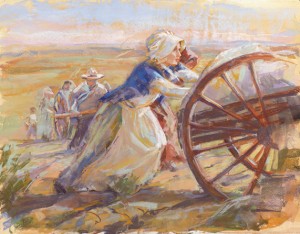 There would be no purpose. It would just be some odd little game God was playing and that’s not how God operates. We are here to gain our bodies, but also to have trials and new experiences, to develop faith, and to use it to live the life God wants us to live, even if He isn’t here with us. We’d already proven we could do that in His presence. Now we’re proving we can do it as adults living away from home.
There would be no purpose. It would just be some odd little game God was playing and that’s not how God operates. We are here to gain our bodies, but also to have trials and new experiences, to develop faith, and to use it to live the life God wants us to live, even if He isn’t here with us. We’d already proven we could do that in His presence. Now we’re proving we can do it as adults living away from home.
In other words, the purpose of life requires us to live in a non-Eden world. I have never personally found a non-LDS person who could answer the question about that purpose in life if you take away all the things that weren’t in Eden. Most religions have no answer to that question.
One thing I love about Mormonism is that it doesn’t leave holes. So many of the other faiths I looked into while choosing a church did. There were gaps that didn’t make sense, and questions that were critical, but couldn’t be answered. I don’t like holes.
Here are a few more holes Mormonism fills for the world:
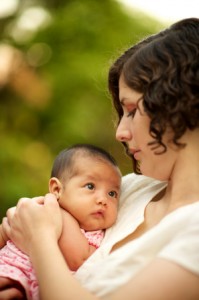 World’s Question: If God is totally fair and loving, and if Jesus taught us to never treat a child badly, why does he cause infants who died before having the opportunity to accept Christ as their Savior or to be baptized to pay a price for that? Why aren’t they automatically saved, since it wasn’t their fault? After all, He chose their death date and their parents. Would He punish them for something that was entirely up to Him, not them?
World’s Question: If God is totally fair and loving, and if Jesus taught us to never treat a child badly, why does he cause infants who died before having the opportunity to accept Christ as their Savior or to be baptized to pay a price for that? Why aren’t they automatically saved, since it wasn’t their fault? After all, He chose their death date and their parents. Would He punish them for something that was entirely up to Him, not them?
Mormon Answer: Mormons believe children younger than eight cannot sin. They are not accountable for the choices they make. If they die, they are promised exaltation. No one is accountable for what they could not control. Even those older than eight who die without first having an opportunity to voluntarily accept Jesus Christ as their Savior will have the opportunity to learn about Him and to decide whether or not to accept His gospel after their death—it is not a second chance; it is a first chance and the only way God can be fair and just.
World’s Question: Why are some people born into easy lives and others into hard lives?
If this life was the only life, nothing about life would be fair. If there was this life and a life after, there would still be gaps in the fairness. Only when this life is the center of three stages is life really fair, when looked at from an eternal perspective.
We were already someone in our previous time as a spirit. We had personalities and some were more righteous than others. We had strengths and weaknesses. God watched us and noticed how we grew and who we were choosing to become. He saw what was still needed at the time we were ready to come to earth.
This life stage is all about preparing for the next one. It is also a time to become the person God knows we can be. That means we need to have specific experiences tailored just to us.
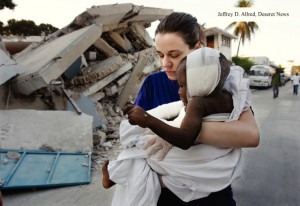 Since we know our choices here will impact our lives to come and we know that at least one choice we made in Heaven—whether to follow Christ or Lucifer—impacted our eternal lives, it is possible our lives in the pre-mortal world influenced the conditions to which we were sent here on Earth. That is not saying that a hard life is a punishment for a bad previous life. Many people who have faced very hard childhoods used those trials to strengthen them and to help them become amazing adults. For some, a difficult childhood was a gift that let them build strength, courage, and compassion later in life. In the same way, wealth can be a terrible trial, leading some to become spoiled, selfish, and judgmental. We may not fully understand the life we were given until we return home to Heaven. In the eternal scheme of things, we will often see what looked like a trial as a blessing instead, and what seemed to be blessings might then be understood to be trials.
Since we know our choices here will impact our lives to come and we know that at least one choice we made in Heaven—whether to follow Christ or Lucifer—impacted our eternal lives, it is possible our lives in the pre-mortal world influenced the conditions to which we were sent here on Earth. That is not saying that a hard life is a punishment for a bad previous life. Many people who have faced very hard childhoods used those trials to strengthen them and to help them become amazing adults. For some, a difficult childhood was a gift that let them build strength, courage, and compassion later in life. In the same way, wealth can be a terrible trial, leading some to become spoiled, selfish, and judgmental. We may not fully understand the life we were given until we return home to Heaven. In the eternal scheme of things, we will often see what looked like a trial as a blessing instead, and what seemed to be blessings might then be understood to be trials.
World’s Question: Why doesn’t God stop hunger, war, and other causes of great suffering?
Mormon Answer: The discussion above helps us to understand why we have trials, but there are some additional eternal truths that help to answer this specific question.
When God sent us to Earth, He promised the agency we had enjoyed in Heaven would continue here on Earth. Agency is the right to make choices for ourselves. Without it, we are mere puppets and life is purposeless. The choices we make impact our lives, both on Earth and in our eternal lives. However, they can also impact other people. Very few choices affect only ourselves, despite the popular argument that it is “my life and I can do what I want.” While this is true, it can also be irresponsible if we don’t think about our impact on others.
God could stop someone from starting a war. He could end all hunger. However, he cannot interrupt our agency. People have to be able to make choices in their lives, even if those choices affect others. He can teach us to do the right thing. He can put the right thoughts into our minds, but we have to choose whether or not to put them into our hearts. Much of the world’s suffering exists because of someone’s poor choices, whether the choice was theirs or the decision of another person. Someone may have caused the situation or someone may have failed to help end it.
God knows that we can make choices that help others. When people ask me why God doesn’t do something about all those starving children in a certain country, I respond that He did—He put a longing for their well-being into the heart of the person asking the question. This longing was put there to encourage them to go out and do something. Rather than sitting back in our comfortable chairs and insisting God do all the work, God wants us to get up and do our part. He can then help us in our sincere and righteous desires. This is good for us, as well as for the people we help. If children are hungry, it is because there are too many people not doing what needs to be done to help.
It is our responsibility to be God’s hands in helping the world. Most of His good work is carried out when true followers of God step in to follow the impressions God placed into their hearts and minds. Instead of saying, “You do it, God; I don’t feel like it,” we must learn to say, “Thank you for showing me what to do. I’ll get right on it.”
I love Mormonism for its ability to fill in the missing pieces of eternal life in a way that creates a complete picture for me. I am so much better able to understand God’s plan for me now than I was before I became a Mormon. While God doesn’t explain everything to us, He has explained everything that really mattered—and shown me how to find my place in it all.
About Terrie Lynn Bittner
The late Terrie Lynn Bittner—beloved wife, mother, grandmother, and friend—was the author of two homeschooling books and numerous articles, including several that appeared in Latter-day Saint magazines. She became a member of the Church at the age of 17 and began sharing her faith online in 1992.

